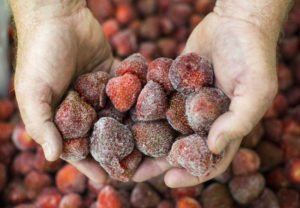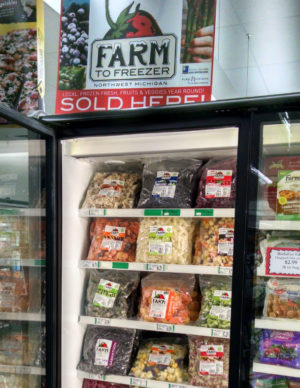Michigan Farm to Freezer creates new customers with value-added processing
Brandon Seng tells a story about one day while he was running a school lunch program in Manistee, Michigan.
Seng happened to learn from a 14-year-old girl who came through the lunch line that day that she had never tasted a blueberry before. Ever. He was astounded.
The small northwestern Michigan community is in a region that’s home to multiple farms and orchards. The growing season is short, but rich in its abundance of apples, cherries, blueberries, and vegetables of all varieties.
But this girl’s low-income family got most of their food free from a pantry where fresh produce was scarce. Her other meals were provided at school. He contacted a local grower and had blueberries on hand the following day.
In fact, he bought 500 pounds, saving most of it in a blast freezer to use in the off-season. Seng didn’t stop there. Soon he was buying bulk fresh peppers, Romanesco cauliflower, asparagus and kale, also prepping and freezing it for use over the long winter.
And so began the baby steps that led to Seng and partner Mark Coe forming Michigan Farm to Freezer, a processor of all-Michigan fresh produce for institutional use and retail sales. Managing a 1,400-acre fruit and vegetable farm, Coe had been interested in creating a frozen farm-branded product line that would extend Michigan’s short growing season.
Starting out as a workforce development program of Goodwill Northern Michigan, Farm to Freezer operated out of a Goodwill incubator facility in nearby Traverse City, Michigan, to freeze and package small batches of local produce. Its customers were mainly concentrated in the northwestern Lower Peninsula region, and even while outsourcing to some area processors who were willing to freeze in their smaller batches to help meet demand, business took off to the point that Seng and Coe needed more capacity and space.

Enter Detroit’s historic Eastern Market. The huge downtown urban market sees vendors come from all over with produce, meats, cheeses, flowers and a variety of other products. Its Saturday farmers’ market attracts thousands each weekend, and Eastern Market Corporation Food Innovation Director Mike DiBernardo said a feasibility study had shown that value-added processing in the form of individually quick frozen (IQF) technology was needed — and lacking — in Southeast Michigan.
“After we did the feasibility study, we looked for partners,” DiBernardo said. “We reached out to (Brandon and Mark) and discussed the possibilities of how we could help them expand their operation and fill a need here in the market.”
And that need was providing a value-added processing outlet for market vendors, Seng said.
“You’ve got a lot of folks coming to market with room on their truck and product back at the farm not making it to market that might be a little bit aesthetically challenged,” he said. “This is a network of growers who are already coming to the market that we can tap into and piggyback on – ‘What can you drop off at our facility when you’re coming to sell your grade A stuff at the market?’
Because cut up, it doesn’t matter if the produce is pretty or not to begin with, he said.
“They don’t have to be a grower (vendor) at Eastern Market to participate in the program, either,” Seng said. “It just gives us a location that is relatively known to the agricultural community.”
Eastern Market had obtained a federal grant to take that idea further, and found an abandoned meat processing facility nearby to house Michigan Farm to Freezer’s Detroit location.
“We were able to help Brandon secure a lease and help him with some grant funding we were awarded,” DiBernardo said.

As a result, Michigan Farm to Freezer has been in the process of renovating the facility to become its new, 14,000-square–foot processing facility in the Eastern Market district.
“Of that, 9,000 square feet will be a holding freezer,” Seng said. “That will really up our capacity to be able to store product that’s grown in season for sale throughout the winter months.”
Included in the operation is a 1,500-square-foot IQF processing room with a tunnel freezer that will enable them to process 1,500 pounds per hour. There’s also space for a blanche kettle and cooling line, with a separate 2,000-square-foot packaging room. They’ll only be processing during the growing season.
“It means jobs in Michigan, and it means a place for growers in southeast Michigan to bring their products,” DiBernardo said.
Seng said they’ll mostly be handling vegetables in the Detroit facility, and will continue to work with processors to the north for much of their fruit freezing production to keep it close to where the crops are grown. They’re also connecting with fresh-cut processors to handle some of the preparation on larger runs.
“We’ve done most of the work ourselves (so far), but we did have a few discussions from people that do fresh-cut and any larger kind of run of product, we’re looking at dicing and blanching in their facility,” Seng said. “They’ll deliver it to us at 40 degrees and then we just run it across our belt freezer.”

Coe said their model also incorporates having some growers deliver crops to processors with whom Michigan Farm to Freezer also does business, and then their company buys it from the processor.
Today, Michigan Farm to Freezer sources from around 30 farms, and counting, to produce a full lineup of products that sell at retail in two sizes bearing its label. More than 60 school districts buy its products, along with institutional customers.
One of them is the University of Michigan in Ann Arbor, where Frank Turchan, executive chef for Michigan Dining, said sourcing product from Michigan Farm to Freezer helps make it possible to provide Michigan produce in the wintertime. Turchan has been ordering frozen apples, sweet and tart cherries and blueberries. He plans to expand with cauliflower, various carrots, kohlrabi and other vegetables next year.
In October, he was just receiving the last deliveries of fresh produce from his local farm suppliers. At that point, he was going to switch to frozen and promote the story to those his department serves – mostly students in residence halls – with 24,000 meals a day.
“It will help us immensely,” he said. “It gives us more variety.”
Ann Lind, who succeeded Seng as foodservice director at the Catholic Central Schools in Manistee, also said the local frozen produce extends the growing season. She thaws cherries and puts them on a fruit bar or in desserts; ditto blueberries. Apples get made into apple crisp. Vegetables are roasted or used as ingredients in recipes.
Michigan Farm to Freezer products are also available in more than 140 retail locations, and Coe said they just picked up 80 metro Detroit area Kroger stores. They’re also expanding relationships with distributors.
“We’ve created a new market for these products,” Coe said. “It’s a huge opportunity.”
All told, the company saw $300,000 in sales in 2016 with production coordinated out of its original facility. Seng and Coe expected that number to be at $800,000 by the end of 2017.
Meanwhile, Seng will likely never forget the young teen who planted the seed for Michigan Farm to Freezer when he made sure she finally got to taste a blueberry.
“To be able to sit there and watch that experience was something else,” he said. “I was just so excited, and humbled at the same time. I thought, ‘This is something we have to do more of.’”







